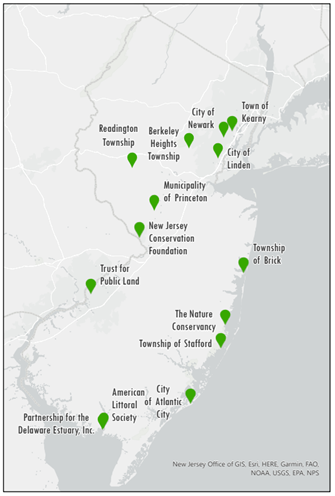Natural Climate Solutions Grant Program
Case Study: Natural Climate Solutions Grant Program
Statewide
OPPORTUNITY/CHALLENGES
Natural resources sequester carbon and serve a critical role in meeting the State’s 2050 goal of reducing greenhouse gas emissions by 80% from 2006 levels. The NJ Global Warning Response Act 80×50 Report notes that although conservation efforts could increase carbon sequestration by 33% by 2050, it would require significant change in New Jersey’s land policy and practices. Recognizing this, the Department launched the Natural Climate Solutions (NCS) Grant Program. The NCS program funds projects that restore and enhance New Jersey’s natural blue and green carbon sinks, including salt marshes, seagrass beds, forests, urban parks and woodlands, and street trees. Blue carbon refers to carbon captured by oceans and coastal ecosystems, while green carbon refers to carbon stored in the biosphere through plants and forested areas. These natural spaces serve as a sink of sequestered carbon, which both removes and stores carbon from the atmosphere, offsetting existing carbon emissions. Though relevant for all of New Jersey, this initiative is particularly valuable to overburdened communities that are especially vulnerable to the effects of climate change.
GRANTEES
Grantees of the first round include the City of Atlantic City, Berkeley Heights Township, Town of Kearny, City of Linden, City of Newark, New Jersey Conservation Foundation, Trust for Public Land, American Littoral Society, Township of Brick, The Nature Conservancy, Partnership for the Delaware Estuary, Stafford Township, Municipality of Princeton, and the Readington Township Environmental Commission.
ACTION
Applicants can submit projects that fall into one of six categories: Living Shorelines, Restoring Tidal Flows in Tidal Wetlands, Tidal Salt Marsh Vegetation Restoration, Submerged Aquatic Vegetation Restoration, Forest Restoration, and Urban Forest Canopy and Water Quality Enhancement. Eligible applicants include:
- State, county, and local government units within New Jersey, including State agencies or school boards
- State universities and colleges
- Interstate agencies of which New Jersey is a member
- Private landowners owning property in New Jersey (private property project must provide at least 25% matching funds)
- Local nonprofit organizations recognized by the Internal Revenue Service under Section 501(c)(3) of the Internal Revenue Code authorized to operation in the State of New Jersey.
FUNDING/RESOURCES
This program is fully funded and managed by NJDEP. Funding is provided by auction proceeds from the Regional Greenhouse Gas Initiative (RGGI). Through the Natural Climate Solutions grant, NJDEP has awarded nearly $24.3 million dollars for blue and green carbon projects. For more details on the RGGI strategic funding plan, check out: https://nj.gov/rggi/docs/rggi-strategic-funding-plan.pdf
RESULTS & BENEFITS
Investing in green and blue carbon projects is expected to aid in New Jersey’s greenhouse gas emission goals, as outlined in the NJ Global Warming Response Act 80×50 Report. In the first round of the grant, launched in 2023, 14 projects were awarded. It is estimated these projects will sequester 32,710 metric tons of carbon dioxide equivalent (MTCO₂e) by 2050. For more information on these projects, check out: https://www.nj.gov/dep/newsrel/2023/23_0003.htm
